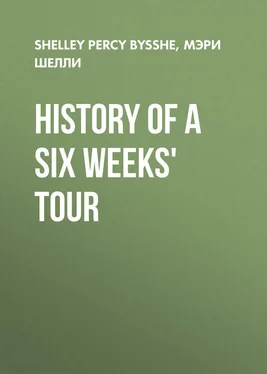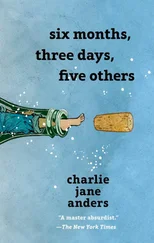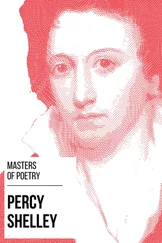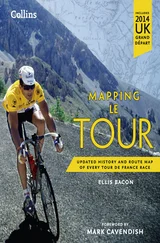Percy Shelley - History of a Six Weeks' Tour
Здесь есть возможность читать онлайн «Percy Shelley - History of a Six Weeks' Tour» — ознакомительный отрывок электронной книги совершенно бесплатно, а после прочтения отрывка купить полную версию. В некоторых случаях можно слушать аудио, скачать через торрент в формате fb2 и присутствует краткое содержание. Издательство: Иностранный паблик, Жанр: literature_19, foreign_antique, foreign_prose, на английском языке. Описание произведения, (предисловие) а так же отзывы посетителей доступны на портале библиотеки ЛибКат.
- Название:History of a Six Weeks' Tour
- Автор:
- Издательство:Иностранный паблик
- Жанр:
- Год:неизвестен
- ISBN:нет данных
- Рейтинг книги:5 / 5. Голосов: 1
-
Избранное:Добавить в избранное
- Отзывы:
-
Ваша оценка:
- 100
- 1
- 2
- 3
- 4
- 5
History of a Six Weeks' Tour: краткое содержание, описание и аннотация
Предлагаем к чтению аннотацию, описание, краткое содержание или предисловие (зависит от того, что написал сам автор книги «History of a Six Weeks' Tour»). Если вы не нашли необходимую информацию о книге — напишите в комментариях, мы постараемся отыскать её.
History of a Six Weeks' Tour — читать онлайн ознакомительный отрывок
Ниже представлен текст книги, разбитый по страницам. Система сохранения места последней прочитанной страницы, позволяет с удобством читать онлайн бесплатно книгу «History of a Six Weeks' Tour», без необходимости каждый раз заново искать на чём Вы остановились. Поставьте закладку, и сможете в любой момент перейти на страницу, на которой закончили чтение.
Интервал:
Закладка:
As we prepared our dinner in a place, so filthy that the sight of it alone was sufficient to destroy our appetite, the people of the village collected around us, squalid with dirt, their countenances expressing every thing that is disgusting and brutal. They seemed indeed entirely detached from the rest of the world, and ignorant of all that was passing in it. There is much less communication between the various towns of France than in England. The use of passports may easily account for this: these people did not know that Napoleon was deposed, and when we asked why they did not rebuild their cottages, they replied, that they were afraid that the Cossacs would destroy them again upon their return. Echemine (the name of this village) is in every respect the most disgusting place I ever met with.
Two leagues beyond, on the same road, we came to the village of Pavillon, so unlike Echemine, that we might have fancied ourselves in another quarter of the globe; here every thing denoted cleanliness and hospitality; many of the cottages were destroyed, but the inhabitants were employed in repairing them. What could occasion so great a difference?
Still our road lay over this track of uncultivated country, and our eyes were fatigued by observing nothing but a white expanse of ground, where no bramble or stunted shrub adorned its barrenness. Towards evening we reached a small plantation of vines, it appeared like one of those islands of verdure that are met with in the midst of the sands of Lybia, but the grapes were not yet ripe. S*** was totally incapable of walking, and C*** and I were very tired before we arrived at Troyes.
We rested here for the night, and devoted the following day to a consideration of the manner in which we should proceed. S***'s sprain rendered our pedestrianism impossible. We accordingly sold our mule, and bought an open voiture that went on four wheels, for five Napoleons, and hired a man with a mule for eight more, to convey us to Neufchâtel in six days.
The suburbs of Troyes were destroyed, and the town itself dirty and uninviting. I remained at the inn writing, while S*** and C*** arranged this bargain and visited the cathedral of the town; and the next morning we departed in our voiture for Neufchâtel. A curious instance of French vanity occurred on leaving this town. Our voiturier pointed to the plain around, and mentioned, that it had been the scene of a battle between the Russians and the French. “In which the Russians gained the victory?” – “Ah no, Madame,” replied the man, “the French are never beaten.” “But how was it then,” we asked, “that the Russians had entered Troyes soon after?” – “Oh, after having been defeated, they took a circuitous route, and thus entered the town.”
Vandeuvres is a pleasant town, at which we rested during the hours of noon. We walked in the grounds of a nobleman, laid out in the English taste, and terminated in a pretty wood; it was a scene that reminded us of our native country. As we left Vandeuvres the aspect of the country suddenly changed; abrupt hills, covered with vineyards, intermixed with trees, enclosed a narrow valley, the channel of the Aube. The view was interspersed by green meadows, groves of poplar and white willow, and spires of village churches, which the Cossacs had yet spared. Many villages, ruined by the war, occupied the most romantic spots.
In the evening we arrived at Barsur-Aube, a beautiful town, placed at the opening of the vale where the hills terminate abruptly. We climbed the highest of these, but scarce had we reached the top, when a mist descended upon every thing, and the rain began to fall: we were wet through before we could reach our inn. It was evening, and the laden clouds made the darkness almost as deep as that of midnight; but in the west an unusually brilliant and fiery redness occupied an opening in the vapours, and added to the interest of our little expedition: the cottage lights were reflected in the tranquil river, and the dark hills behind, dimly seen, resembled vast and frowning mountains.
As we quitted Bar-sur-Aube, we at the same time bade a short farewell to hills. Passing through the towns of Chaumont, Langres (which was situated on a hill, and surrounded by ancient fortifications), Champlitte, and Gray, we travelled for nearly three days through plains, where the country gently undulated, and relieved the eye from a perpetual flat, without exciting any peculiar interest. Gentle rivers, their banks ornamented by a few trees, stole through these plains, and a thousand beautiful summer insects skimmed over the streams. The third day was a day of rain, and the first that had taken place during our journey. We were soon wet through, and were glad to stop at a little inn to dry ourselves. The reception we received here was very unprepossessing, the people still kept their seats round the fire, and seemed very unwilling to make way for the dripping guests. In the afternoon, however, the weather became fine, and at about six in the evening we entered Besançon.
Hills had appeared in the distance during the whole day, and we had advanced gradually towards them, but were unprepared for the scene that broke upon us as we passed the gate of this city. On quitting the walls, the road wound underneath a high precipice; on the other side the hills rose more gradually, and the green valley that intervened between them was watered by a pleasant river; before us arose an amphitheatre of hills covered with vines, but irregular and rocky. The last gate of the town was cut through the precipitous rock that arose on one side, and in that place jutted into the road.
This approach to mountain scenery filled us with delight; it was otherwise with our voiturier : he came from the plains of Troyes, and these hills so utterly scared him, that he in some degree lost his reason. After winding through the valley, we began to ascend the mountains which were its boundary: we left our voiture , and walked on, delighted with every new view that broke upon us.
When we had ascended the hills for about a mile and a half, we found our voiturier at the door of a wretched inn, having taken the mule from the voiture , and obstinately determined to remain for the night at this miserable village of Mort. We could only submit, for he was deaf to all we could urge, and to our remonstrances only replied, Je ne puis pas .
Our beds were too uncomfortable to allow a thought of sleeping in them: we could only procure one room, and our hostess gave us to understand that our voiturier was to occupy the same apartment. It was of little consequence, as we had previously resolved not to enter the beds. The evening was fine, and after the rain the air was perfumed by many delicious scents. We climbed to a rocky seat on the hill that overlooked the village, where we remained until sunset. The night was passed by the kitchen fire in a wretched manner, striving to catch a few moments of sleep, which were denied to us. At three in the morning we pursued our journey.
Our road led to the summit of the hills that environ Besançon. From the top of one of these we saw the whole expanse of the valley filled with a white undulating mist, which was pierced like islands by the piny mountains. The sun had just risen, and a ray of red light lay upon the waves of this fluctuating vapour. To the west, opposite the sun, it seemed driven by the light against the rocks in immense masses of foaming cloud, until it became lost in the distance, mixing its tints with the fleecy sky.
Our voiturier insisted on remaining two hours at the village of Noè, although we were unable to procure any dinner, and wished to go on to the next stage. I have already said, that the hills scared his senses, and he had become disobliging, sullen, and stupid. While he waited we walked to the neighbouring wood: it was a fine forest, carpeted beautifully with moss, and in various places overhung by rocks, in whose crevices young pines had taken root, and spread their branches for shade to those below; the noon heat was intense, and we were glad to shelter ourselves from it in the shady retreats of this lovely forest.
Читать дальшеИнтервал:
Закладка:
Похожие книги на «History of a Six Weeks' Tour»
Представляем Вашему вниманию похожие книги на «History of a Six Weeks' Tour» списком для выбора. Мы отобрали схожую по названию и смыслу литературу в надежде предоставить читателям больше вариантов отыскать новые, интересные, ещё непрочитанные произведения.
Обсуждение, отзывы о книге «History of a Six Weeks' Tour» и просто собственные мнения читателей. Оставьте ваши комментарии, напишите, что Вы думаете о произведении, его смысле или главных героях. Укажите что конкретно понравилось, а что нет, и почему Вы так считаете.












